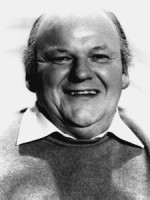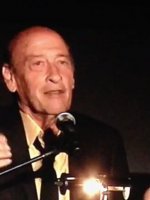George MacDonald Fraser est un Scénariste Britannique né le 2 avril 1925 à Carlisle (Royaume-uni)
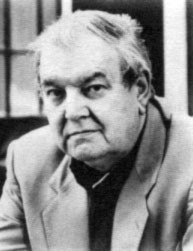
George MacDonald Fraser, OBE FRSL (2 April 1925 – 2 January 2008) was an English-born author of Scottish descent, who wrote historical novels, non-fiction books and several screenplays. He is best known for a series of works that featured the character Flashman.
Fraser was educated at Carlisle Grammar School and Glasgow Academy; he later described himself as a poor student due to "sheer laziness". This meant that he was unable to follow his father's wishes and study medicine.
War service
In 1943, during World War II, he enlisted in The Border Regiment and served in the Burma Campaign, recounted in his memoir Quartered Safe Out Here. After completion of his OCTU (Officer Cadet Training Unit) course, Fraser was granted a commission into the Gordon Highlanders. He served with them in the Middle East and North Africa immediately after the war, notably in Tripoli. In 1947 Fraser decided against remaining with the army and took up his demobilisation. He has written semi-autobiographical stories and anecdotes of his time with the Gordon Highlanders in the "McAuslan" series.
Journalism
After his discharge, Fraser returned to the United Kingdom. Through his father he got a job as a trainee reporter on the Carlisle Journal and married another journalist, Kathleen Hetherington. They travelled to Canada, working on newspapers there, before returning again to Scotland. Starting in 1953, he worked for many years as a journalist at the Glasgow Herald newspaper where he was deputy editor from 1964 until 1969. He briefly held the title of acting editor.
Novelist
In 1966 Fraser got the idea to turn Flashman, a fictional coward and bully originally created by Thomas Hughes in Tom Brown's School Days, into a hero and wrote a novel around his exploits. The book proved popular and led to a series of further novels, presented as packets of memoirs written by the nonagenarian Flashman looking back on his days as a hero of the British Army during the 19th century. The series is notable for the accuracy of the historical settings and praise from critics. P.G. Wodehouse said of Flashman, "If ever there was a time when I felt that 'watcher-of-the-skies-when-a-new-planet' stuff, it was when I read the first Flashman."
Fraser also fictionalised his post-war military experience as the adventures of the rather unassuming "Dand" MacNeill in a Scottish regiment of the line. This series of short stories is noted for the strong and strange characters surrounding McNeill, including an aged and prototypical colonel, a perfect-soldier regimental sergeant-major, a Wodehousian adjutant, an active and dedicated pipe sergeant, a die-hard Algerian revolutionary, various blackguards and spivs, and, most memorably, Private John McAuslan, the dirtiest soldier in the world. Featuring games of golf, scrapes and run-ins with the police both military and civil, the transfer of the die-hard to the French (of all people), and McAuslan's various disasters, these works form a picture of the British army in the period immediately after World War II.
Screenwriter
The film rights to Flashman were bought by Richard Lester who was unable to get the film funded but hired Fraser to write the screenplay for The Three Musketeers in Christmas 1972. This was successful and also launched Fraser as a screenwriter. The movie "Royal Flash" by Richard Lester with screenplay by Fraser appeared in 1975. For the next twenty years he would alternate between novels and film scripts, including work as a script doctor.
Source : Wikidata
George MacDonald Fraser

- Infos
- Photos
- Meilleurs films
- Famille
- Personnages
- Récompenses
Nationalité Royaume-uni
Naissance 2 avril 1925 à Carlisle (Royaume-uni)
Mort 2 janvier 2008 (à 82 ans)
Récompenses Officier de l'ordre de l'Empire britannique
Naissance 2 avril 1925 à Carlisle (Royaume-uni)
Mort 2 janvier 2008 (à 82 ans)
Récompenses Officier de l'ordre de l'Empire britannique
George MacDonald Fraser, OBE FRSL (2 April 1925 – 2 January 2008) was an English-born author of Scottish descent, who wrote historical novels, non-fiction books and several screenplays. He is best known for a series of works that featured the character Flashman.
Biographie
Fraser was born to Scottish parents in Carlisle, England on 2 April 1925. His father was a doctor and his mother a nurse. It was his father who passed on to Fraser his love of reading, and a passion for his Scottish heritage.Fraser was educated at Carlisle Grammar School and Glasgow Academy; he later described himself as a poor student due to "sheer laziness". This meant that he was unable to follow his father's wishes and study medicine.
War service
In 1943, during World War II, he enlisted in The Border Regiment and served in the Burma Campaign, recounted in his memoir Quartered Safe Out Here. After completion of his OCTU (Officer Cadet Training Unit) course, Fraser was granted a commission into the Gordon Highlanders. He served with them in the Middle East and North Africa immediately after the war, notably in Tripoli. In 1947 Fraser decided against remaining with the army and took up his demobilisation. He has written semi-autobiographical stories and anecdotes of his time with the Gordon Highlanders in the "McAuslan" series.
Journalism
After his discharge, Fraser returned to the United Kingdom. Through his father he got a job as a trainee reporter on the Carlisle Journal and married another journalist, Kathleen Hetherington. They travelled to Canada, working on newspapers there, before returning again to Scotland. Starting in 1953, he worked for many years as a journalist at the Glasgow Herald newspaper where he was deputy editor from 1964 until 1969. He briefly held the title of acting editor.
Novelist
In 1966 Fraser got the idea to turn Flashman, a fictional coward and bully originally created by Thomas Hughes in Tom Brown's School Days, into a hero and wrote a novel around his exploits. The book proved popular and led to a series of further novels, presented as packets of memoirs written by the nonagenarian Flashman looking back on his days as a hero of the British Army during the 19th century. The series is notable for the accuracy of the historical settings and praise from critics. P.G. Wodehouse said of Flashman, "If ever there was a time when I felt that 'watcher-of-the-skies-when-a-new-planet' stuff, it was when I read the first Flashman."
Fraser also fictionalised his post-war military experience as the adventures of the rather unassuming "Dand" MacNeill in a Scottish regiment of the line. This series of short stories is noted for the strong and strange characters surrounding McNeill, including an aged and prototypical colonel, a perfect-soldier regimental sergeant-major, a Wodehousian adjutant, an active and dedicated pipe sergeant, a die-hard Algerian revolutionary, various blackguards and spivs, and, most memorably, Private John McAuslan, the dirtiest soldier in the world. Featuring games of golf, scrapes and run-ins with the police both military and civil, the transfer of the die-hard to the French (of all people), and McAuslan's various disasters, these works form a picture of the British army in the period immediately after World War II.
Screenwriter
The film rights to Flashman were bought by Richard Lester who was unable to get the film funded but hired Fraser to write the screenplay for The Three Musketeers in Christmas 1972. This was successful and also launched Fraser as a screenwriter. The movie "Royal Flash" by Richard Lester with screenplay by Fraser appeared in 1975. For the next twenty years he would alternate between novels and film scripts, including work as a script doctor.
Ses meilleurs films
Le plus souvent avec
Filmographie de George MacDonald Fraser (10 films)
Scénariste

Le Retour des Mousquetaires (1989)
, 1h42Réalisé par Richard Lester
Origine France
Genres Comédie, Cape et d'épée, Action, Aventure
Acteurs Michael York, Oliver Reed, Frank Finlay, Richard Chamberlain, C. Thomas Howell, Kim Cattrall
Rôle Ecrivain
Note59%





À Paris, en 1649, la Fronde gronde contre le Cardinal Mazarin, premier ministre de la régente Anne d'Autriche. Mazarin demande à D'Artagnan de rallier à sa cause les trois mousquetaires Athos, Porthos et Aramis. Porthos, désormais veuf, est ravi de renouer avec les aventures.
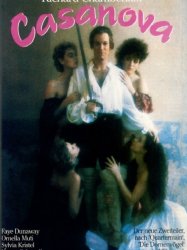
Casanova (1987)
Réalisé par Simon Langton
Genres Biographie, Comédie, Comédie romantique, Romance
Thèmes Film sur un écrivain
Acteurs Richard Chamberlain, Faye Dunaway, Sylvia Kristel, Ornella Muti, Hanna Schygulla, Sophie Ward
Rôle Ecrivain
Note59%





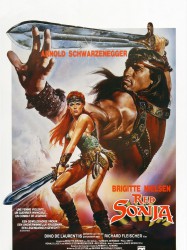 , 1h29
, 1h29Réalisé par Richard Fleischer
Origine Etats-Unis
Genres Science-fiction, Fantastique, Fantasy, Action, Aventure
Thèmes Magie, Sexualité, Le viol, Mise en scène d'une sorcière, Rape and revenge
Acteurs Brigitte Nielsen, Arnold Schwarzenegger, Sandahl Bergman, Paul L. Smith, Janet Ågren, Ernie Reyes
Note51%





La maléfique reine Gedren et ses soldats attaquent un temple où des prêtresses gardent un talisman magique assurant de grands pouvoirs à la personne qui le détient.

Octopussy (1983)
, 2h11Réalisé par John Glen
Origine Royaume-uni
Genres Thriller, Action, Aventure, Espionnage
Thèmes L'enfance, Espionnage, Le terrorisme, Transport, Le train, Politique, Arme nucléaire
Acteurs Roger Moore, Maud Adams, Louis Jourdan, Steven Berkoff, Desmond Llewelyn, Kristina Wayborn
Rôle Scénariste à l'image
Note64%





Après l'assassinat de l'agent 009 à Berlin, qui avait réussi à rejoindre l'ambassade du Royaume-Uni pour remettre un œuf de Fabergé à l'ambassadeur, James Bond assiste à la mise aux enchères de l’œuf. Le richissime Kamal Khan en fait l'acquisition. Ce prince indien exilé semble nourrir de secrètes accointances avec le général renégat Orlov. Bond doit découvrir le lien qu'il y a entre l’œuf, les complots du tandem russo-indien et la désirable, bien que mystérieuse, Octopussy, afin d'éviter une Troisième Guerre mondiale.

Ashanti (1979)
, 1h58Réalisé par Richard Fleischer
Origine Etats-Unis
Genres Drame, Action, Aventure
Thèmes Afrique post-coloniale, Esclavagisme, Sexualité, Transport, Erotique, Prostitution, Automobile, Road movie, Thriller érotique, Film de poursuite
Acteurs Michael Caine, Peter Ustinov, Akosua Busia, Kabir Bedi, Eric Pohlmann, Beverly Johnson
Note54%





David et Anansa Linderby se trouvent en Afrique dans le cadre d'une mission de l'OMS. Ils visitent le village où se déroule la campagne de vaccination. Alors que David prend quelques photos, Anansa partie nager seule, est enlevée. Les rumeurs circulent qu'elle serait victime d'un trafic de femmes, un certain Suleiman chercherait à la vendre au prince Hassan. David se tourne alors vers les autorités, mais face à leur déni du phénomène d'esclavagisme, se résout à mener les recherches seul.
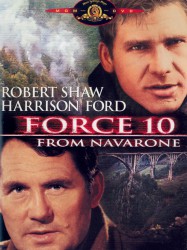
L'ouragan vient de Navarone (1978)
, 1h58Réalisé par Guy Hamilton
Origine Royaume-uni
Genres Drame, Guerre, Thriller, Action, Aventure
Thèmes Politique
Acteurs Robert Shaw, Harrison Ford, Edward Fox, Barbara Bach, Carl Weathers, Franco Nero
Note63%





Les rescapés du commando britannique qui a réussi à détruire les canons de Navarone s'en sont sortis malgré la présence d'un traitre parmi eux. Ils croyaient celui-ci exécuté mais, il semblerait qu'il soit toujours vivant. C'est en réalité un espion allemand qui continuerait de sévir en Yougoslavie occupée au milieu des Partisans. Mallory et Miller étant les seuls à pouvoir l'identifier, ils sont à nouveau envoyés avec une unité américaine appelée Ouragan (Force 10), conduite par le colonel Barnsby, lequel n'est pas très favorable à leur présence. Chacun des chefs d'équipe, Barnsby et Mallory, ignore la véritable mission de l'autre. Leur avion est touché, et, à l'atterrissage, le commando est dispersé et décimé. Les survivants sont recueillis par des soi-disant Partisans, qui s'avèrent être en réalité des Tchetniks alliés aux Allemands. Prisonniers, ils doivent alors convaincre les Allemands qu'ils ne sont pas des espions, pour ne pas être fusillés.
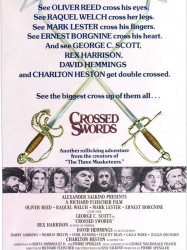
Le Prince et le Pauvre (1977)
, 1h53Réalisé par Olivier Assayas, Richard Fleischer, Laurent Perrin
Origine Etats-Unis
Genres Drame, Comédie, Action, Aventure
Thèmes L'enfance, La famille
Acteurs Mark Lester, Ernest Borgnine, Oliver Reed, Charlton Heston, Raquel Welch, Rex Harrison
Rôle Ecrivain
Note61%





Vers le milieu du XVI siècle, le prince héritier d'Angleterre, un enfant, a troqué ses vêtements contre ceux d'un petit camarade du peuple qui lui ressemble trait pour trait. Si bien que le petit pauvre, en dépit de ses protestations, va être couronné à la mort du souverain...

Le Froussard héroïque (1975)
, 1h42Réalisé par Richard Lester
Origine Royaume-uni
Genres Comédie, Aventure, Romance
Acteurs Malcolm McDowell, Alan Bates, Oliver Reed, Florinda Bolkan, Joss Ackland, Tom Bell
Rôle Créateur de nouvelle
Note62%





Les systèmes de voyous Harry Flashman (Lâche Malcolm McDowell) pour entrer dans les cercles royaux de l'Europe du 19ème siècle aller nulle part jusqu'à ce qu'il rencontre une paire de nobles sournoises avec leur propre ordre du jour. A leur demande pressante, Flashman accepte de se recréer comme un noble de Prusse bogus pour courtiser une belle duchesse. Mais le plan de bancales vient rapidement démêlé, et il est bientôt sur la course de plusieurs nouveaux ennemis qui demandent tous la tête du vaurien.
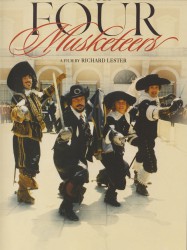
On l'appelait Milady (1974)
, 1h48Réalisé par Richard Lester
Origine Espagne
Genres Drame, Comédie, Cape et d'épée, Action, Aventure
Acteurs Oliver Reed, Charlton Heston, Raquel Welch, Faye Dunaway, Richard Chamberlain, Frank Finlay
Note68%





Après l'« affaire des Ferrets de la reine », Milady de Winter est décidée à prendre sa revanche en faisant enlever Constance Bonacieux, dont D'Artagnan est amoureux. Soutenue par le comte de Rochefort, qui part porter secours aux assiégés de La Rochelle, elle s'engage à participer à l'assassinat du duc de Buckingham. D'Artagnan, Athos, Porthos et Aramis parviennent à échapper à de multiples attaques mais ils ne réussissent pas à empêcher la mort du Duc. Le cardinal de Richelieu parvient cependant à prendre La Rochelle et les quatre mousquetaires se lancent alors au secours de Constance, retenue prisonnière dans un couvent. Ils arrivent cependant trop tard et découvrent le corps de Constance, assassinée par Milady. Ils signent alors l'arrêt de mort de cette dernière qui, une fois capturée est livrée à la hache du bourreau de Béthune. Par la suite, D'Artagnan est arrêté par les gardes du cardinal et se retrouve devant ce dernier. Découvrant que le jeune mousquetaire a une fois de plus déjoué ses plans, Richelieu décide de lui remettre un brevet de lieutenant en échange de son silence.
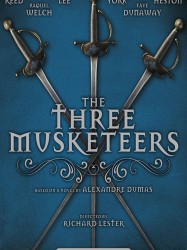
Les Trois Mousquetaires (1973)
, 1h45Réalisé par Richard Lester
Origine Etats-Unis
Genres Drame, Comédie, Cape et d'épée, Action, Aventure, Historique, Romance
Thèmes Films pour enfants
Acteurs Oliver Reed, Charlton Heston, Raquel Welch, Faye Dunaway, Richard Chamberlain, Frank Finlay
Note70%





Arrivant à Paris de sa Gascogne natale, le jeune D'Artagnan parvient à entrer dans le fameux régiment des Mousquetaires du roi Louis XIII. Il se lie d'amitié avec trois d'entre eux : Athos, Porthos et Aramis et deviendront inséparables. Sa logeuse, Constance Bonacieux, dont il est tombé amoureux, est aussi la confidente de la reine Anne d'Autriche. C'est ainsi qu'il sera mêlé à l'intrigue des ferrets que la reine a donnés à son amant, le duc de Buckingham. Déjouant les pièges de Milady de Winter et du comte de Rochefort, les âmes damnées du cardinal de Richelieu, il sauvera l'honneur de la reine.
 Connexion
Connexion


